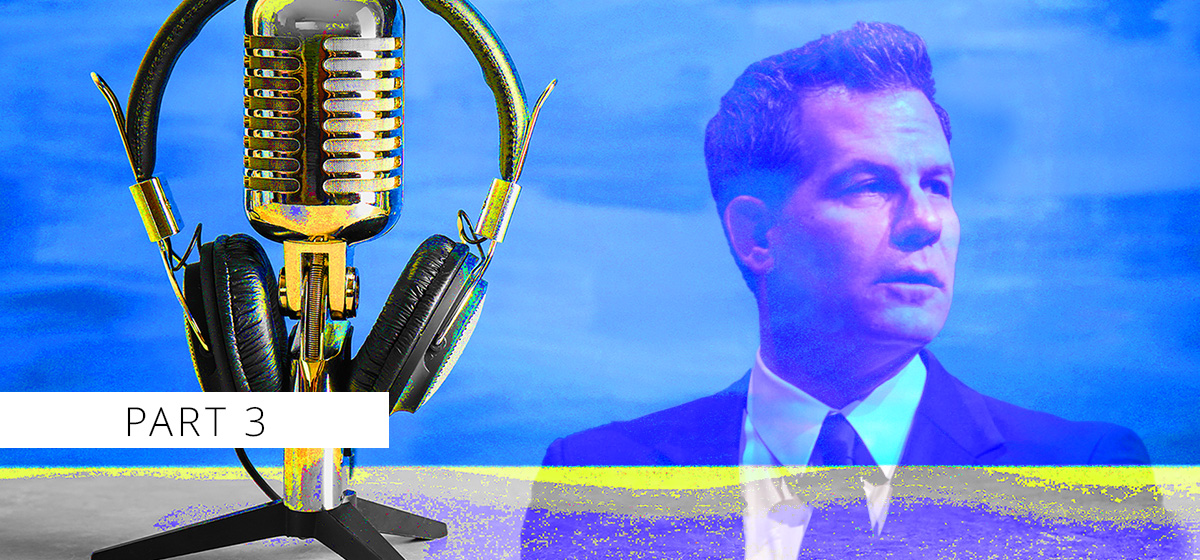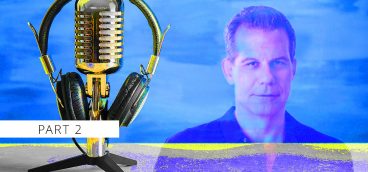Richard Florida: Iconic Thoughts on Pittsburgh

Donald Bonk interviews Richard Florida, influential professor, author and urban theorist, as part of the Pittsburgh Tomorrow podcast series. This is the third part of a three-part interview. The transcript is abridged and edited for clarity.
View the episode archive here. Read Richard Florida’s Creative Class bio here. Read his University of Toronto bio here.
“So much of America has become embroiled in becoming rich and becoming a celebrity culture… The fact that Pittsburgh is a set of neighborhoods with neighbors who know one another makes it this Mister Rogers kind of place. Do everything in your power to protect that.” —Richard Florida
Richard Florida’s final quote from episode 12 (part 2)
Florida: We set up our front porch here. People walk by and have a glass of wine and talk in the evening. That’s like a Pittsburgh thing except in Pittsburgh it’s over a parking spot. I think focusing really hard on making sure that Pittsburgh isn’t pulled apart—respect for difference—will be important. The fact that Pittsburgh is blue and red is important. But in Pittsburgh, that isn’t a pitched battle like it is in the country. People even in their same family have a Trump supporter and a Biden supporter.
Richard Florida episode 13 (part 3)
Florida: People I like are voting for Trump. I don’t hate them. I like them. We have a political difference. So I think that gets magnified nationally. When we meet and talk, we’re on the same page; we want the same thing for our kids. Making Pittsburgh a place for open dialogue, making a place for Pittsburgh where it doesn’t get captured in this political correctness… that’s what I loved about Carnegie Mellon.
We were never captured by political correctness. We’re an open dialogue, where there’s social cohesion. That’s number one. Two, making sure that Pittsburgh stays livable and that there’s a real premium put on health and safety. One of the things we’re going to be looking for is healthier and safer places for us and for our kids to live. Other than those moonshots I’ve mentioned earlier, protecting and enhancing the fabric of the neighborhoods is very important.
So much of America has become embroiled in becoming rich and becoming a celebrity culture. Go to some of these places—I’ll pick the Hamptons as one—and everyone is behind a 30-foot hedge line. Just think about row after row of houses behind a 30-foot hedge line. You see the same thing in parts of Los Angeles. I like the Hamptons and Los Angeles, but the fact that Pittsburgh is a set of neighborhoods with neighbors who know one another makes it this Mister Rogers kind of place. Do everything in your power to protect that.
The only other thing I would say is what’s eroded in America, but not in Pittsburgh, are public goods.
You know what made America great? You mentioned Taylor Allderdice High School. I see this in Toronto. Our schools are provincially funded. My kids could walk to two public schools. Our Catholic schools are provincially funded, too. I can get my kids in because I’m Catholic and they have a baptismal certificate, but some people can’t because they’re not Catholic. So, my kids could walk to public schools, a Catholic school and two private schools, including a girls’ school, if they want to.
Pittsburgh also has that. Many American communities put their kids on a bus. These public goods—whether it’s schools, or publicly supported health care in Toronto, or all of these public parks which are abundant in Pittsburgh—make you human.
We both wanted our two kids to be born in Canada, even though the American system of labor and delivery is more chi chi. We went into labor and delivery in a very good hospital. We had very good high-risk pregnancy doctor. And I will tell you, we were really the only middle-class people in labor and delivery. Everyone else was a visible minority or a new Canadian, which is an immigrant or someone from a less advantaged situation. We didn’t have a private room. We had a shared room.
We didn’t go to a special class on birth, you know, how to take care of a kid. We went to that class with single moms and less advantaged people. And it makes you freakin’ human. It makes you understand that you’re not in a bubble with other people who happen to be Carnegie Mellon or University of Toronto professors. There is a shared humanity.
Look, life is tough, and you want what’s best for your kids and your family. But I think Pittsburgh is more like Toronto in that. There is a shared humanity, a shared sense of history, a shared sense that we’re in it together, whether we’re Catholic or Jewish or Protestant or Scot, whatever the freak we are.
These are the kinds of things that Pittsburgh needs to double down. They may be more sociological than economic, and they might be more of the fabric of the society as opposed to economic development initiatives, but that’s what Pittsburgh has to hang on to. If we want to save America—I am being really candid about that—you’ve got to pull America back in that direction.
Bonk: That’s exceptionally powerful, and my own personal experiences ratify that. Many members of my family have voted for other candidates. My best friend growing up is a graphic artist, and he voted in the other direction than I did. Yet, I love and respect him because of the father that he is. He’s one of the best fathers and most hard working people. And so, yes, I can disagree with him politically, but we still have a drink together and talk. My life would be less without him and other members of my family who think differently.
Florida: I have another story for you before we end. I remember living in Shadyside; we had a nice little gourmet grocery store where you’d go and get a nice sandwich. I would go there on the weekends with my friends. Paul O’Neill happened to be the U.S Secretary of Treasury. He had run the GAO (Government Accountability Office) and Alcoa. Paul would pull up there on the weekends when he was freaking Secretary of the Treasury, in his car, and he’d get a sandwich. There were no bodyguards. There was no private security. There was only Paul O’Neill, Pittsburgher. It was a neighborhood place and he didn’t feel any compunction to come in there like a big shot. And I think that’s what Pittsburgh is.
Bonk: It’s the ability to cross boundaries, like you said, with shared culture and history and respect. I think respect is at the baseline of all of this. If you like and respect your neighbors and your friends, who may even think differently than you, that’s all pulling in the same direction for a better city.
Florida: One hundred percent. You know what I think about your current mayor. I knew Bill Peduto when he was a staffer to a councilman. Bill and I were both single when I lived in Pittsburgh, and you know, you’re bored at night, we’d go out to these crappy little bars in Shadyside, Cappy’s and (Le)Mardi Gras, and we’d sit there and talk about urbanism. We’d sit there for hours, drinking a beer, talking well into the night. We would be surrounded by people who were quite unlike us and not afraid after some lubrication to voice their viewpoints, some of whom were very conservative.
But Bill would sit there and this was I think when he was a staff member and then ultimately probably a councilman, not mayor. We would have vigorous, friendly dialogue. That’s the mayor, the one guy who would hang in a local saloon with real people, not fancy people, real people, and talk about the issues of his city. You know the sports teams he likes and the sports teams he doesn’t like, the rivalries he liked and what we all envision.
Regardless our political complexion, we all wanted Pittsburgh to be better. We didn’t agree necessarily. I think that’s what Pittsburgh is. It’s a place where all voices can be heard and there isn’t a lot of snootiness. Snootiness doesn’t get you very far in Pittsburgh.
Bonk: I think that’s powerful. Just to tie that in, in the 1970s when Pittsburgh had both great sports success but not necessarily great economic environments, it did create a Team Pittsburgh mentality: The Pirates, the Steelers and later the Penguins. But I think that the Team Pittsburgh mentality, you know, from the top, middle or bottom, is something that seems to cross over generations in terms of respect and collaboration.
Florida: My ethnic group, the Italians who came to Newark, had those same values. My wife is Jordanian; her father came from Jordan to the Detroit suburbs. When I look at the new ethnic groups, whether they’re Indian or Asian or Latino, they have the same. We were forged in different periods, but we have the same values: values of family and community and wanting a better life. That’s what Pittsburgh can give us.
It may be that this COVID-19 crisis, as horrific as it is, forces us to introspect in ways that make us understand better what is real substance and what we want from our lives and for our kids’ lives. And that doesn’t mean that we can have a little chi chi-ness. And that means young people can enjoy New York or San Francisco when they’re young and hang out late and meet.
Over time, we revert to these core values. Hopefully as a society, we back away from decadence and “me-too-ism” and “me-first-ism” and a “me society” and return to a society of community and social cohesion. Pittsburgh reflects that while also valuing actual capability. And, being a functioning meritocracy, Pittsburgh values being a great hockey player, a great baseball player, a great football player, or a great intellectual researcher in a way that most places around the United States don’t.
Bonk: Competence and being good at what you do is the tie. Lastly, you just jumped something in my mind. My folks ran a grocery store for 41 years. I grew up in it.
Dr. Fauci’s parents ran a pharmacy in Brooklyn and cared for the community. He was on his bicycle delivering prescriptions to people before, and later through the meritocracy: through a top Catholic prep school in New York, then Holy Cross and Cornell, then came to lead key public health and research programs for five or six presidents. It’s taking that neighborhood tie to the meritocratic level, up to the top.
Florida: Pittsburgh enables many people to grow up like Tony Fauci or you did. People still can grow up in that kind of a neighborhood with the eyes on the street. Jane Jacobs called it the eyes on the street, a sense of community.
Pittsburgh is not this generic place. I said that in “The Rise of the Creative Class.” It’s real. People want the authentic. That’s what Pittsburgh has in it. It has that and it has ideas. I love the place.
I just feel great, Donald, that we did this. I called Pittsburgh The Base Case back almost 20 years ago.
I said as Pittsburgh goes, so goes the rest of these heartlands. And I think Pittsburgh has shown that it’s made it. Let’s hope more places can follow its playbook and get in on this, too.
Bonk: I really appreciate your thoughts. You’ve really thought deeply and carefully, but I’m also impressed by your passion and love for Pittsburgh. I think that’s what a lot of people in the audience, especially the Pittsburgh Tomorrow audience, will really appreciate. As someone said, “No one cares how much you know, until they know how much you care.” It’s obvious that you care deeply about Pittsburgh. I can’t thank you enough for taking time today. Any last thoughts to share?
Florida: I don’t know how I stumbled along. I thought I was going to be a rock and roll guitar player. I loved Jimi Hendrix, Eric Clapton and Jimmy Page, and somehow being steeped in the Newark civil disturbance, I found cities and I found my passion and I care deeply.
Initially, I cared about them intellectually. Probably when I met you at Carnegie Mellon, it was more of an intellectual passion to uncover the way they were. Now it’s more than intellectual; I feel.
This is a legacy of Pittsburgh. I would say to myself at Carnegie Mellon, “I’m publishing these papers. I’m writing these books.” This literally would go on in my head. I was turning 40 at the time; now I’m over 60. I said, look, my parents had nothing. My dad had a seventh grade education. They gave everything to me and my brother. They put me in Catholic school. They put me through Rutgers. I got a Ph.D. on a scholarship to Columbia. I went to Ohio State and Ohio State gave me grants and I went to Carnegie Mellon and Carnegie Mellon paid my salary. I got National Science Foundation grants and Ford Foundation grants and support from the university and the community.
I’m obligated. That’s why I wrote “The Rise of the Creative Class.” I literally said to myself, “I’m obligated to take this knowledge in a form that just won’t win appeal to academics, but that is being written for people who care about cities and mayors and economic development professionals.” As I’ve gotten older, it’s become more of a passion. What keeps me going is the thought that in a dysfunctional national environment, I can make a small difference.
My ideas are fine, but by motivating people and by literally giving them some hope that it isn’t all going to hell in a handbasket… While America looks like it’s facing very dark times, look at what’s happening in Pittsburgh. Look at what’s happening in Columbus. Look at what’s happening in Newark. Look at what’s happening in Tulsa. I could go on with examples of towns that are remaking themselves, of which Pittsburgh I think is the best one.
Thanks for giving me a chance to talk about Pittsburgh. I don’t get a chance to do that often enough these days.







